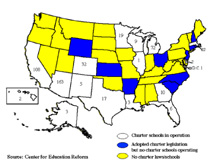 Purdue News
Purdue News
 Purdue News
Purdue News
WEST LAFAYETTE, Ind. -- The charter school movement is distracting state governments from implementing education reform for all students, says the dean of Purdue University's School of Education.

|
Charter schools are taxpayer-funded public schools that receive special dispensation to operate outside of established school regulations. These schools are contracted, or "chartered," by a state as separate legal entities and are accountable for their results at the end of the contract period, which is typically three to five years.
"The idea is that because charter schools are not bound by bureaucracy and regulations, they can be more innovative," Haring explains. "But that same lack of regulation can also result in a school that is less accountable to students and their parents."
Parent and teacher groups with new ideas for school reform often initiate the process of setting up a charter school. Curriculums vary widely, with some schools chartered to emphasize "the three R's" and others offering unstructured learning environments such as those that draw heavily from the creative arts for class material.
Admission at a charter school is open to all students, but enrollment is typically limited because the schools are small. Twenty-six states now have legislation in place to set up charter schools; most such schools are in California, Arizona and Michigan.
Haring says the time, effort and money being put into charter schools is not only draining resources from existing facilities, but also is distracting educators from their goal of nationwide reform.
"Why should it take a charter to accomplish education reform?" Haring asks. "Research tells us smaller schools that emphasize parental involvement and a sense of community are more effective. We need the public to support sound educational practices even when it means tax increases so that more schools -- not just charter schools -- can be as good as we need them to be."
CONTACT: Haring, (765) 494-2336; e-mail, haringm@vm.cc.purdue.edu
PHOTO CAPTION
Charter school status for each of the 50 states as of August, according to the Center
for Education Reform. (Graphic used by permission.)
Color graphic, electronic transmission, and Web and ftp download available. Graphic
ID: Haring.Charter